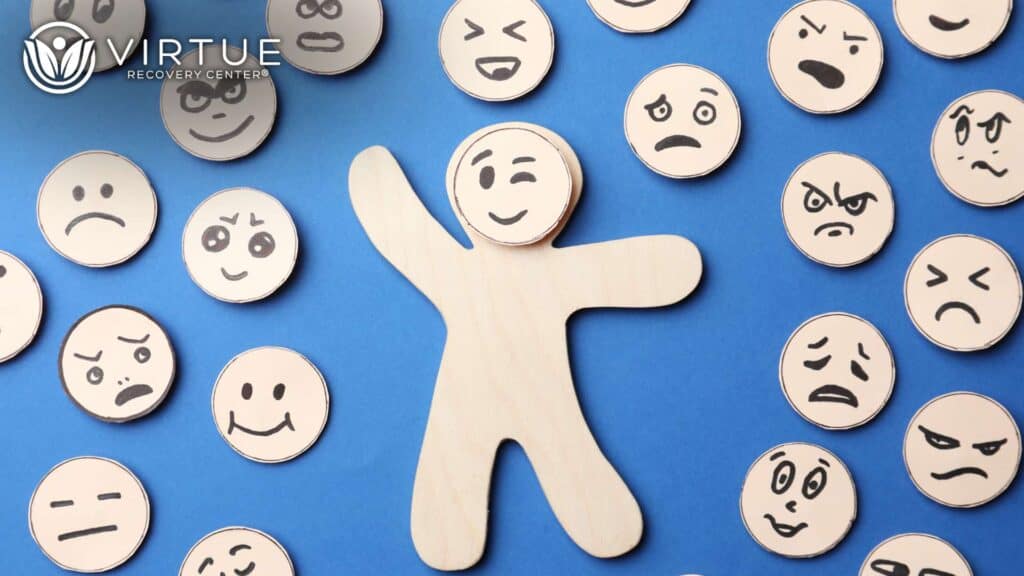Key Takeaways
- Drug addiction impacts the brain’s ability to regulate emotions, leading to mood instability.
- Substances like cocaine, alcohol, and opioids can disrupt emotional processes and mental health.
- Professional treatment, including therapy and holistic approaches, can help restore emotional regulation and stability.
Introduction
Drug addiction does more than harm the body; it profoundly affects the mind. For many, addiction starts as a way to escape pain or boost happiness. Over time, the substances that initially brought relief can cause chaos in emotional and mental well-being.
This article explores how drug addiction affects mood and emotional regulation. Understanding these effects and seeking help can make recovery smoother and life healthier.
The Link Between Substance Abuse Addiction and Emotional Dysregulation
Addiction interferes with how the brain manages emotions. This disruption happens primarily in the prefrontal cortex, which is responsible for decision-making, and the limbic system, which controls emotions and memory.
Substances like methamphetamine and alcohol flood the brain with chemicals like dopamine. While this causes temporary euphoria, the brain’s natural balance is thrown off. Over time, the brain produces less dopamine naturally, making it challenging to feel happiness or satisfaction without drugs.
People often use substances to numb emotional pain or stress, but this creates a vicious cycle. Emotional problems worsen, leading to greater dependence on drugs or alcohol to cope.
How Substance Use Disorder Disrupts Mood Stability
Chemical Imbalances and Mood Swings in Parts of The Brain
Drugs alter chemicals in the brain, causing mood swings that range from euphoria to deep depression. For example, opioids may create calmness but are followed by irritability and sadness once the drug wears off.
Emotional Responses Shift Over Time Affected by Drug Abuse
Initially, drug use may feel like it helps manage emotions. However, with continued use, the highs become less satisfying, and negative emotions take over. Anger, anxiety, and sadness can dominate daily life, making relationships and responsibilities harder to manage.
Chronic Emotional Instability in The Human Brain
Prolonged drug use leads to long-term damage to the brain’s ability to regulate emotions. Even when someone stops using drugs, mood instability may persist for months or years. Professional treatment can help rebuild emotional health.
Co-Occurring Mental Health Conditions and Emotional Struggles
Addiction often goes hand-in-hand with mental health disorders like anxiety and depression. These conditions can make emotional regulation even harder for those struggling with addiction.
For some, drug use starts as a way to cope with untreated mental health problems. For others, addiction itself creates or worsens these disorders. Adolescents are especially vulnerable because their brains are still developing. Early drug use can set the stage for emotional struggles that last into adulthood.
Women and men may experience different emotional effects of addiction. While women might be more prone to depression and anxiety, men are often more likely to exhibit anger or aggression. Recognizing these differences helps tailor treatment to individual needs.
Restoring Emotional Regulation Through Treatment
Detox and Emotional Stabilization
The first step in recovery is detox, where the body clears itself of drugs. This process can be challenging, as withdrawal symptoms like irritability, anxiety, and mood swings are common. Medical detox programs provide support to manage these symptoms safely.
Behavioral Therapies for Emotional Healing
Cognitive Behavioral Therapy (CBT) and Dialectical Behavior Therapy (DBT) are proven methods for helping individuals regain emotional control. CBT allows individuals identify and change harmful thought patterns, while DBT focuses on managing emotions and reducing impulsive behaviors.
Holistic Approaches
Holistic therapies, such as mindfulness, yoga, and art therapy, are also valuable. These approaches teach stress management, encourage self-expression, and help individuals reconnect with their emotions healthily.
Building a Support Network
A strong support system is essential for emotional recovery. Group therapy, family counseling, and peer support groups create safe spaces for sharing experiences and rebuilding trust with loved ones.
Conclusion
Drug addiction deeply affects mood and emotional regulation, but recovery is possible. Through detox, therapy, and a strong support system, individuals can restore emotional stability and regain control of their lives.
If you or a loved one is struggling with addiction, help is just a phone call away. Contact Virtue Recovery Chandler at 866-338-5779 today to take the first step toward a healthier, happier future.
FAQs
How does addiction affect mood regulation?
Addiction alters brain chemistry, making it difficult to manage emotions. Mood swings and emotional instability are common effects.
Can addiction cause long-term emotional issues?
Yes, prolonged drug use can damage the brain’s ability to regulate emotions, leading to lasting challenges with mood stability.
What therapies help with emotional regulation in recovery?
Cognitive Behavioral Therapy (CBT) and Dialectical Behavior Therapy (DBT) are effective methods for improving emotional control during recovery.
How does recovery improve emotional stability?
Treatment restores brain function and teaches healthy coping mechanisms, helping individuals regain emotional balance.
Where can I find support for addiction and emotional struggles?
Virtue Recovery Chandler offers compassionate care for addiction and emotional health. Call 866-338-5779 to learn more.
What are the risk factors for substance use on emotional processes?
Substance use can heighten emotional instability by impairing brain regions responsible for regulating mood and stress responses. Risk factors include underlying mental health disorders, chronic stress, trauma, and genetic predisposition, all of which increase vulnerability to emotional dysregulation through substance use.
What are the effects of drug use on mood?
Drug use can cause dramatic mood swings, ranging from euphoria and heightened energy to irritability, depression, and anxiety. Over time, substances may deplete brain chemicals like dopamine and serotonin, leading to persistent mood disorders and difficulty regulating emotions even when sober.
What does dual diagnosis mean?
Dual diagnosis refers to the co-occurrence of a substance use disorder and a mental health condition, such as depression or anxiety. Effective treatment requires addressing both conditions simultaneously through an integrated approach that includes therapy, medication, and support.
What are common drug-seeking behaviors?
Drug-seeking behaviors often include exaggerating symptoms to obtain prescriptions, doctor shopping to secure multiple sources, and forging or altering prescriptions. Other signs include frequent “loss” of medication, unexplained financial issues, and an obsessive focus on obtaining or using drugs.
Can drugs cause compulsive behavior?
Yes, drugs can cause compulsive behavior by altering brain pathways associated with reward, impulse control, and decision-making. This leads to an uncontrollable urge to use substances despite negative consequences, as the brain prioritizes drug use over other essential activities or responsibilities.
How Does Meth Addiction Impact Mood and Emotional Regulation?
The signs of meth addiction identified can have a profound impact on mood and emotional regulation. Chronic meth use can lead to symptoms like anxiety, depression, and mood swings. The drug alters brain chemistry, making it difficult for users to regulate their emotions and experience pleasure, leading to further addiction.
Resources
https://pmc.ncbi.nlm.nih.gov/articles/PMC10087816/
https://www.sciencedirect.com/science/article/abs/pii/S0165178120333230








